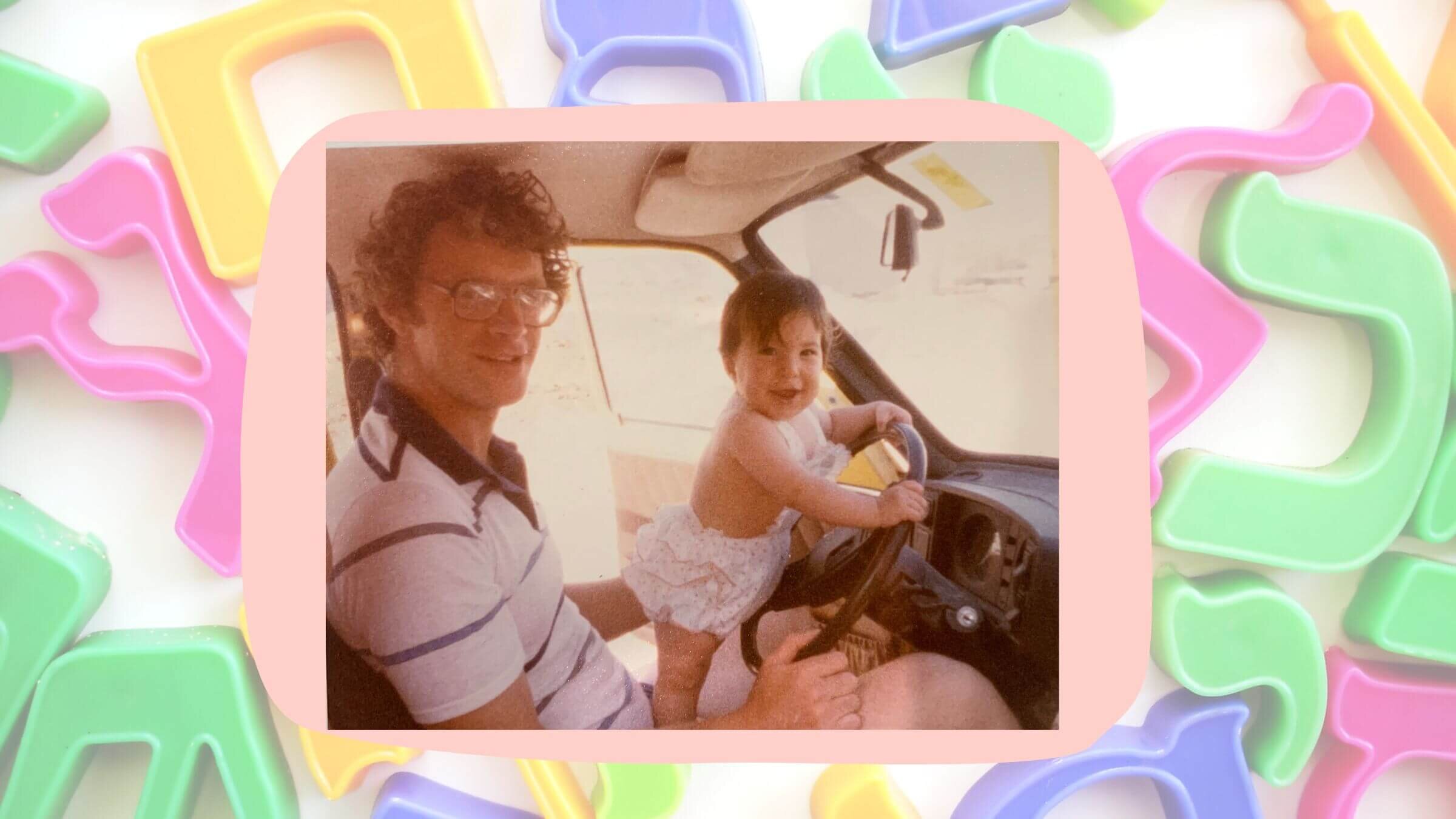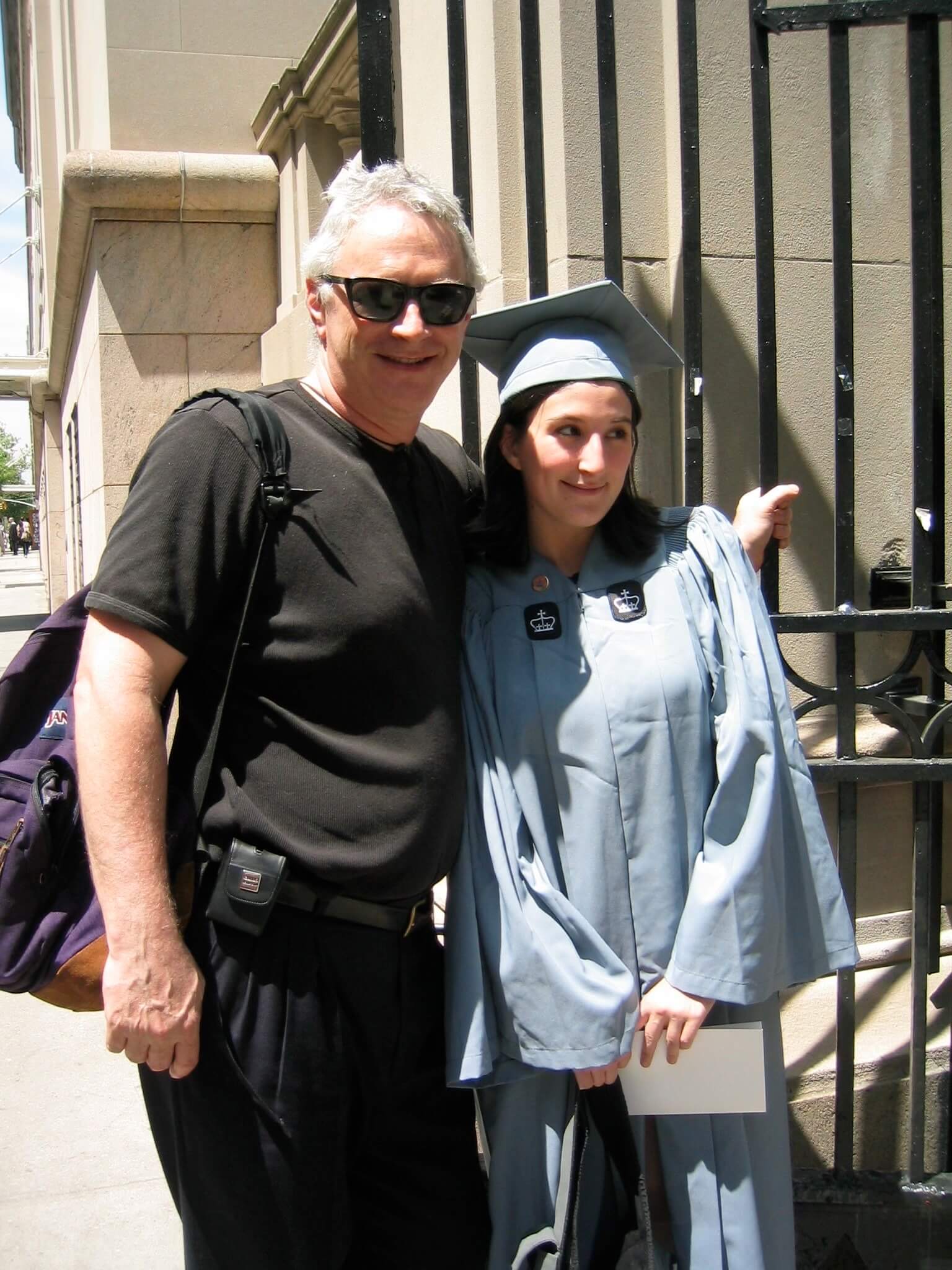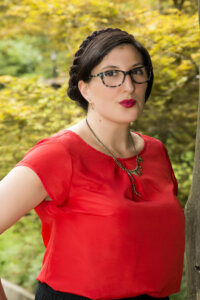I started learning Hebrew for my father. I became obsessed with it after Oct. 7
Learning my father’s language is helping me connect to my own Jewish future at an especially precarious moment

The author as a baby with her father in Israel. Photo-illustration by Nora Berman/Lux Alptraum
It was the “Ceasefire Now” poster in Yiddish that was my breaking point. A friend had shared it in her Instagram story, emphasizing the importance of us Jews reclaiming Yiddish as a protest against Zionism and Israel’s abuse of Palestinians. Yiddish, her post implied, was preferable to Hebrew, untainted by any connection to Israel.
“I kinda want to push back on this,” I wrote back to her. “Yiddish is an Ashkenazi language specifically.” I pointed out that other diaspora Jews historically spoke Ladino and various Judeo-Arabic languages, with Hebrew alone serving as a linguistic tether between far-flung Jewish communities.
She was not the first person I’d seen make this point. For years now, there’s been a growing movement to frame Yiddish as a morally superior way to connect with one’s Jewish identity. Yiddish, the theory goes, is a way of reconnecting to our diaspora ancestry, of going deep into our history of communities that survived as outsiders in hostile nations, who created art and culture and community in spite of the oppression, the poverty, the pogroms.
Hebrew, in contrast, is a modern language invented to erase our past — and to unite Jews in a mission of violent ethnonationalism and domination.
But it was, perhaps surprisingly, the Israel-Gaza war that threw my Hebrew practice into overdrive. At a moment when I felt surrounded by messaging about the evils of modern Hebrew, about the symbolic violence that Hebrew had done, not just against Palestinians, but against Jews themselves, I felt compelled to embrace it, if only to prove to myself that Hebrew could be more than a language of right-wing nationalism.
As an Israeli citizen by birth, I was almost a native Hebrew speaker; it was my family’s move back to the U.S. a year after my birth that left me destined to grow up with English only. Over the past few years, I’ve been slowly trying to reclaim my mother tongue, a mission that intensified this past summer when my father was admitted to the hospital after going into cardiac arrest.

During the three weeks that my comatose father hovered in a space between life and death, my Duolingo Hebrew practice became a way to distract myself from my growing dread. After he died, I found a new reason to keep going with my lessons: Improving my Hebrew helped me feel closer to my father, a fluent speaker himself.
The joy I felt at getting closer to my father through Hebrew pushed me past daily Duolingo lessons and into a whole new space where I started watching cartoons with Hebrew dubs, listening to Hebrew podcasts, attempting basic conversations with my Hebrew-speaking family members, and reading and writing posts on Bluesky (a Twitter alternative) in Hebrew.
It wasn’t out of some nationalistic fervor, or a renewed commitment to Zionism. I was, and remain, opposed to the Israeli government’s military actions and apartheid policies, and conflicted about the role Israel has served to protect the safety of Jews around the world. But as anti-Israeli sentiment swelled around me, I realized that my Israeliness — however minimal it might be — was not a thing I could escape or run away from. In learning Hebrew, I could take more control over it, and prove to myself that being Israeli and speaking Hebrew did not inherently require me to support apartheid, oppression or nationalism.
Though I am still quite far away from anything resembling fluency, I’ve spent the past few months improving my Hebrew and expanding my vocabulary by following social media accounts from the Israeli left. I’ve picked up Israeli anti-war slogans, and learned how to say “occupation” in Hebrew. I’ve toyed with the possibility of signing up for classes at This Is Not an Ulpan, the social justice-focused Hebrew-Arabic language school.
And I’ve begun to explore a different version of myself: the me I might have been if my family had stayed in Israel, if I’d spent my childhood not in the suburbs of Philadelphia, but the suburbs of Rehovot. I’ve developed an understanding of the Israeli cry for a “political solution” — the counter to the military assault on Palestinians that has been Israel’s default for decades. I’ve connected with Israelis who, like me, are queer, anti-war leftists. It has felt healing to remind myself that Hebrew can be a way to connect with these communities, too.
None of this is to say that I am against learning Yiddish. When my father was comatose in the hospital, I also dabbled in Duolingo’s Yiddish module; imagining what it must have been like for him to grow up in a Yiddish-speaking home. As I held his hand, I practiced saying “איך בין דײַן טאָכטער” (“I am your daughter” in Yiddish), hoping that hearing his own mother tongue might spark consciousness in his brain. Yiddish, like Hebrew, is a language of my family, my history and my people (and indeed, the original language of this very publication).
One of the most beautiful things about being Jewish is that there are so many languages to learn that can connect us to the various branches of the diaspora, and the various ways that it has been possible to be a Jew over the millennia that our people have existed.
For me, Yiddish helps connect me to a vibrant past and family history. But Hebrew helps connect me to my own Jewish future. It’s a future I hope will make space for a variety of Jewish identities around the world, and for a variety of people to live in safety and peace within the borders of Israel-Palestine.
I am not rejecting Yiddish in favor of Hebrew. I am simply rejecting the notion that there must be a choice at all.
To contact the author, email [email protected].





















